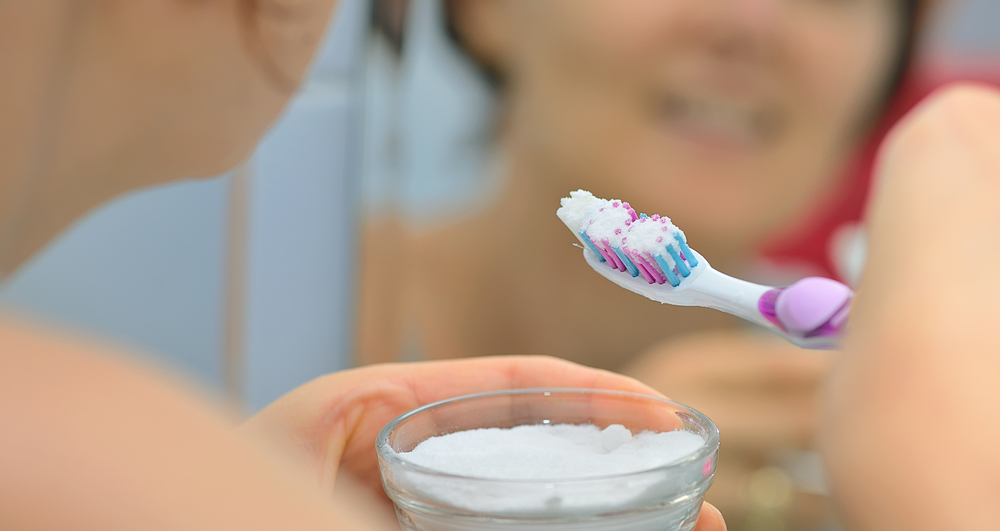Brushing with Baking Soda: A Fizzy Friend or Foe for Your Smile?
Baking soda, a household staple known for its leavening and cleaning properties, has gained popularity as a natural alternative to toothpaste. But is brushing your teeth with baking soda a healthy and effective practice? This comprehensive guide explores the pros and cons of using baking soda for oral hygiene, offering insights to help you decide if it’s the right choice for your smile.
The Power of Baking Soda: Unveiling the Benefits
Baking soda offers some potential benefits when used for oral hygiene:
- Mild Abrasive: Baking soda has a slightly abrasive texture that can help remove surface stains and plaque from teeth. This can be beneficial for achieving a brighter smile.
- Natural Whitener: The gentle abrasive action of baking soda, combined with its mild alkalinity, can help whiten teeth by removing surface stains caused by food and beverages.
- Neutralizes Odors: Baking soda has natural odor-neutralizing properties that can help freshen breath by combating bad breath caused by bacteria.
- Less Abrasive than Some Toothpastes: Compared to some commercial toothpastes containing harsher abrasives, baking soda can be a gentler option for people with sensitive teeth.
- Cost-Effective: Baking soda is a readily available and inexpensive option compared to some commercial toothpastes.
Beyond the Shine: Potential Drawbacks to Consider
While baking soda offers some benefits, there are also potential drawbacks to consider:
- Lacks Fluoride: Fluoride is a crucial ingredient in most toothpastes as it helps strengthen tooth enamel and prevent cavities. Baking soda on its own doesn’t contain fluoride, which is essential for optimal oral health.
- Can Damage Enamel with Excessive Use: While baking soda is generally considered a mild abrasive, overuse or brushing too hard with baking soda can wear down tooth enamel over time.
- May Increase Tooth Sensitivity: For individuals with sensitive teeth, baking soda can further irritate the gums and dentin, causing discomfort.
- Limited Research on Long-Term Effects: While some studies suggest potential benefits of baking soda for oral hygiene, more long-term research is needed to fully understand its effects on oral health.
Baking Soda or Toothpaste? Weighing the Options
So, should you brush your teeth with baking soda? The answer depends on your individual needs and preferences. Here’s a breakdown to help you decide:
Baking Soda Might Be a Good Option For:
- People looking for a natural alternative for occasional use.
- Individuals with mild surface stains who want a gentle whitening boost.
- Those seeking a cost-effective option for occasional use.
Consider Regular Toothpaste If:
- You prioritize cavity prevention and want the benefits of fluoride.
- You have sensitive teeth or experience discomfort with baking soda.
- You’re looking for a more comprehensive oral hygiene solution with additional ingredients like tartar control or breath freshening properties.
Remember: Consulting your dentist is crucial for personalized advice on the best oral hygiene practices for your specific needs.
Baking Soda Brushing Tips: A Recipe for Success (if you choose to use it)
If you decide to use baking soda for brushing your teeth, here are some tips for safe and effective use:
- Mix it Right: Create a paste by mixing a small amount of baking soda (about ½ teaspoon) with water to create a smooth consistency.
- Brush Gently: Use a soft-bristled toothbrush and brush gently for two minutes, twice daily. Avoid applying too much pressure or scrubbing harshly.
- Don’t Skip Regular Toothpaste: While baking soda can be used occasionally, it shouldn’t replace your regular fluoride toothpaste. Use baking soda a few times a week, but prioritize fluoride toothpaste for daily brushing.
- Listen to Your Teeth: If you experience any discomfort, sensitivity, or gum irritation, discontinue using baking soda and consult your dentist.
Frequently Asked Questions (FAQ)
Q: Is baking soda safe to swallow while brushing my teeth?
- A: Small amounts of baking soda swallowed while brushing are generally harmless. However, large ingestions can cause stomach upset.
Q: Can I use baking soda on my gums?
- A: While baking soda can be used for brushing teeth, it’s not recommended for direct application to the gums. The abrasiveness might irritate gum tissue.
Q: Are there any alternative natural ingredients I can use for oral hygiene?
- A: Some people find natural ingredients like coconut oil or neem oil beneficial for oral hygiene. However, there’s limited scientific evidence to support their widespread use. It’s always best to consult your dentist before using any alternative methods.

